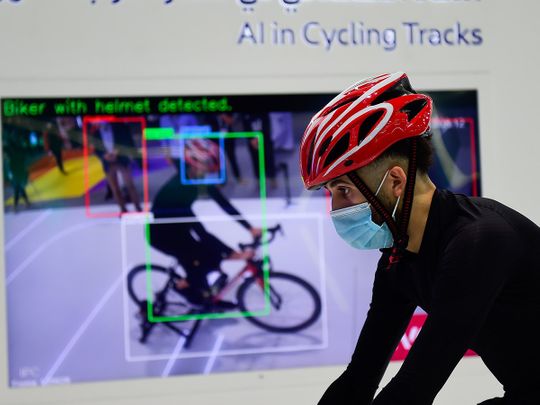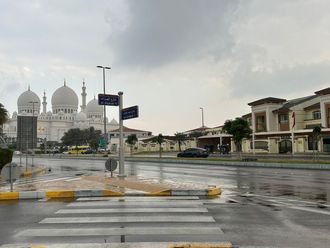
Dubai: To ensure road safety, Dubai will soon have hi-tech cameras installed across city bike tracks to detect cyclists without helmets.
The Roads and Transport Authority (RTA) first implemented the trial phase of the artificial intelligence-powered solution at Nad Al Sheba cycling track and will soon implement it across Dubai, Meera Al Shaikh, RTA director of Smart Services, told reporters on Sunday during the opening day of the 41st edition of GITEX Technology Week.
“Using AI [artificial intelligence] in Cycling Tracks solution, which is a proof of concept developed by EVOTEQ [a digital transformation solutions provider], this revolutionary solution aims to ensure safer roads for cyclists by deploying digital solutions that create a meaningful impact on people’s lives,” the RTA said.
‘Extra nudge’
Wearing protective helmets for cyclists is mandatory in Dubai. Al Shaikh said having cameras in cycling tracks across the emirate will “give an extra nudge to cyclists to be more safety-conscious”.
She added: “The successful trial at Nad Al Shaba will pave the way to a wider implementation of safety cameras across the city.”
Cycling culture
The RTA said the camera will also promote cycling culture in Dubai. The city currently has 463km of cycling track, which will be increased to 739km by 2026, with the aim of linking vital areas with various public transport stations.
“With the city’s aim of becoming the most cycling-friendly city, the use of next-generation technologies is essential as cycling is not only a sport but also a vital link to serve first and last mile mobility needs,” said Mohammed Yousuf Al Mudharreb, CEO of RTA’s Corporate Technology Support Services Sector.
Jihad Tayara, CEO of EVOTEQ, said: “We focused on the utilisation of the latest AI and IoT [Internet of Thing] technologies to validate the viability of the solution by building and testing four keys features: cyclist detection, helmet detection, speed and total occupancy. We’ve developed an extended project roadmap for the complete track journey for cyclists, which aims to improve their safety and experience.”
Detecting speedsters also
According to RTA, “the data gathered by the AI-enabled platform will be leveraged to detect cyclists, joyriders, including joggers, and scooter riders, on the track and determine the current track occupancy. Aside from detecting if cyclists are wearing helmets, the smart solution will also monitor the speed of the cyclists.”
The RTA said: “Further trend analysis will allow the collected data to predict and prevent critical cycling incidents like crowded tracks and accidents, and alert authorities of increased risk conditions based on the collected data.”
Digital nol
Meanwhile, the RTA announced a landmark partnership to launch the digital nol card – used on public transport in Dubai – on Huawei Watch. The announcement follows RTA’s launch of the region’s first digital nol card in collaboration with Huawei last year to support the country’s transition to a cashless society.
Mohammed Al Mudharreb, CEO, Corporate Technology Support Services Sector of RTA, said: “Users can now access the region’s premier digital nol card through the nol Pay app available on the AppGallery on Huawei Watch 3 | 3 Pro.”
Tap and go
He added: “Consumers can use their Huawei Wallet to top up their digital nol cards and pay on-the-go by simply tapping their smartwatch. This grants customers the opportunity to purchase RTA transport tickets, shops, public parks, museums and more using digital nol card.”
Keith Li, Country Head, Huawei Consumer Business Group (CBG) for UAE, said: “By partnering with RTA, we look forward to provide residents and guests of Dubai with seamless smart experiences.”








